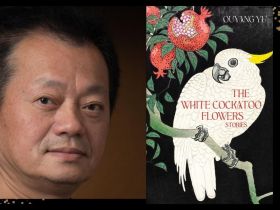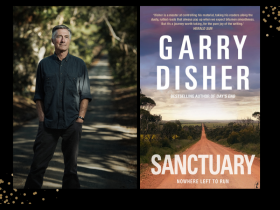Image via Shutterstock.
According to Books and Publishing’s Think Australia 2016 guide the the book publishing trade has recorded steady growth over the last three years.
Now is the time to unearth your manuscript and finally get your hard work published. But after the hours, days, months and years of hard work perfecting your craft – the long nights and early mornings writing – it’s hard to know where to begin.
ArtsHub asked author Emily Brewin about her publication journey. ‘The first step I took was to actually make the decision that I wanted my novel published,’ she said. Brewin’s novel, Hello, Goodbye was published by Allen & Unwin in June this year.
Stop doubting your work
Self-doubt can be many a writer’s downfall; it could mean the difference between seeing a book on the shelves or remaining hidden in your PC.
Brewin admitted to feelings of uncertainty when it came to her art: ‘For a long time I believed that I was writing it for myself, just to see if I could do it. But there came a point when I felt all the blood, sweat and tears I’d shed over it had to come to something more.’
Brewin acknowledged that the decision to take herself seriously was another valuable step towards publication. ‘It’s all in the mind,’ she said.
To ensure your manuscript is ready before you send it to a publisher or agent, follow these steps.

Cover art: Hello, Goodbye by Emily Brewin. Published by Allen & Unwin.
Get by with a little help from your writing group
If you aren’t part of a writing group join one immediately or start your own. The feedback a writing group can give on your manuscript will be invaluable.
A writing group is a safe space where honest critique can happen, and where you can receive feedback with an open mind. You will be amazed at the creative flow the unpicking of your story will create.
Brewin agreed. ‘Get yourself some writing pals, or even better, a writers group … workshop your manuscript to see if there is anything you might do to rework it.’
Reworking and redrafting is essential to get the plot, language or idea right: ‘I redrafted and workshopped and redrafted and workshopped until my fingers bled,’ Brewin said.
Hours can be spent reworking your words and after a while you may start to feel stuck. Brewin admitted after all the rewriting that she had ‘hit a wall.’
Seek the right opinion
If you still feel – despite redrafting and advice from your writing group – that your manuscript is still not publisher ready, perhaps you should seek professional advice.
This is where an impartial, expert opinion may be necessary. Nadine Davidoff, a freelance editor specialising in manuscript assessment, explained that her ‘role is to help the writer get their manuscript in the best possible shape before they approach a publisher.’
A good manuscript assessor will dissect your writing and work with you to make it shine. The editor’s eye is crucial. ‘I’m looking for how the story can be strengthened to make it more convincing and compelling,’ Davidoff explained.
The assessor will work with you in all facets of the manuscript from plot to language. Davidoff revealed an editor will look at ‘how the characters can be developed to render them more complex, multidimensional and relatable; and how the narrative can be tightened and sharpened so that it carries the story with momentum and energy’.
‘I am looking for the central idea or theme of the book and how the narrative can best communicate that core point to the reader in a way that is engaging, powerful and memorable,’ Davidoff said.
Do your research and find a reputable editor like Davidoff who has had over a decade of trade publication experience. Start with the Writer’s Centre in your state such as NSW Writers Centre or Writers Victoria. Writing organisations will give you expert guidance about finding an agent or assessor.

Image: The School of Athens, a fresco by Raphael. Plato (left) and Aristotle (right) workshopping Timaeus and Nicomachean Ethics. Image via Wikipedia.
Get a literary agent on your side
A literary agent will always know more about the book publishing trade than you, that’s their job. They know contracts and legalities, and what each publishing house tends to offer in terms of remuneration.
An excellent agent will have cultivated working relationships with publishers and editors so they will know the right people to contact. And they will do all the strategic thinking for you.
Jenny Darling, of Jenny Darling & Associates, a Melbourne based literary agent, said: ‘A literary agent can always get a better deal for a writer. Some of the terms of a contract might seem esoteric to a new writer but if you’re thinking long term, things that may not be important to you as a writer now might become so in the future. An agent can think ahead, as it were, on your behalf.’
When trying to solicit an agent, much like a publisher, first impressions count. An agent can be hard to secure and will only take on manuscripts they believe it is absolutely ready for publication.
Darling said: ‘Write a good introductory email. Not too long. Do not address the email with “Hi” or “ Hello”. Use a name. Make sure your work is as good as it could be. Do not submit it too early – most people do this. If you think it’s finished put it away for a while, start work on something else and then come back to it after a break.’
Again do your research: start with the Australian Literary Agency Association – any agent that is a member of this association must abide by its code of practice.
Join the slush pile
If you want to hit the ground running and submit straight to the publishing house, ensure you always read the full online submission guidelines. If you do not comply with their guidelines your manuscript will not be considered.
Allen & Unwin state in their submission guidelines: ‘Please note Allen & Unwin only accepts manuscripts correctly submitted through our electronic system. Any hard-copy submissions mailed in will be recycled.’ Don’t let your manuscript get thrown out.
The submission guides will stipulate the formatting, the word count or number of chapters the publishing house are willing to read, and how long until they will get back to you.
Again, do your research and save yourself the waiting time; if you’re writing a children’s picture book don’t target publishing houses that don’t publish picture books. Black Inc’s submission guidelines read: ‘ Please note that we do not accept unsolicited proposals for poetry or children’s books or Quarterly Essays.’
Davidoff adds: ‘There’s no point in sending a literary novel to a publisher who specialises in military history, for example. So authors should take note of who is publishing books in a similar vein to theirs, and then target those publishers.’
Get to know the range of books that the publishing houses have on their shelves and you will begin to get a better understanding of which house to target. And remember it may take up a minimum of eight weeks before you get an email back – patience is key.

Get to the top of the pile. Image via Shutterstock.
Take your time
It’s no secret that getting your manuscript published is going to take some time, but you shouldn’t be in a rush either.
Take your time and do the research. ‘It is essential that an author researches the publishing industry. Authors should also make sure to send their best work out to publishers and not be in a hurry to submit,’ Davidoff said.
She continues: ‘Once a manuscript has been read and rejected by a publisher, it is extremely hard to convince them to look at it again, even if you claim that extensive work has been done. So my advice is: take the time to polish the manuscript so that it really sparkles; and only send it out once you know that it’s your best work.’
Brewin emphasised: ‘The most important thing to remember is to keep trying. Unless you are extremely lucky, your manuscript will probably be rejected at least once, if not over and over again.’
‘Don’t take it personally and don’t be disheartened. Try and take these rejections as an opportunity to improve your work and try to remember it’s not called a publication journey for nothing.’





